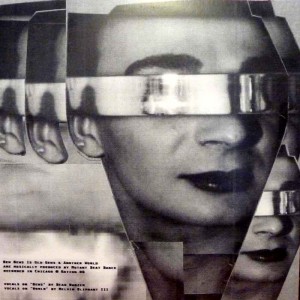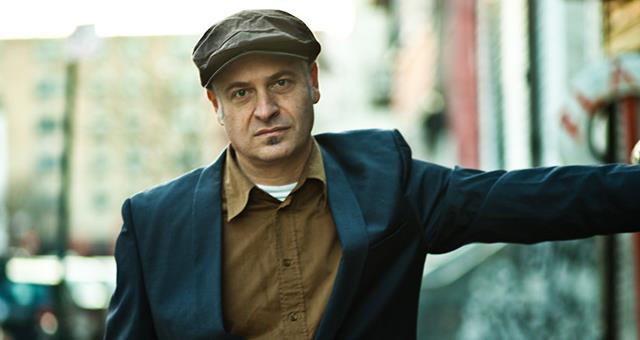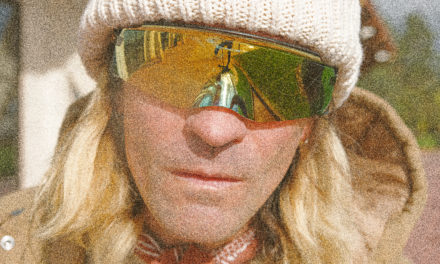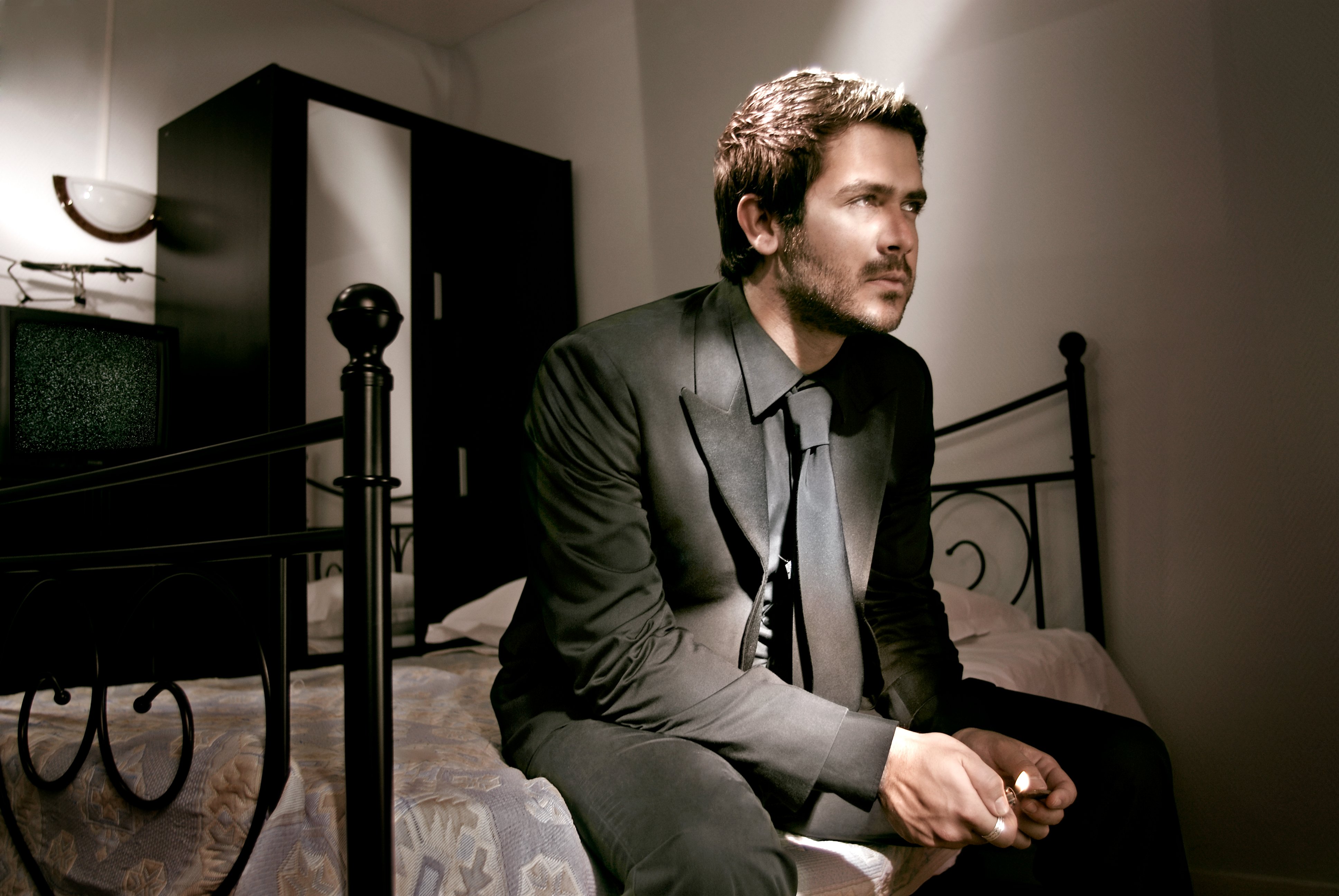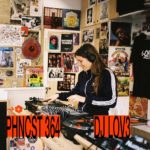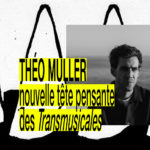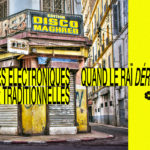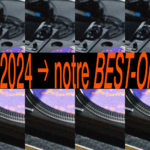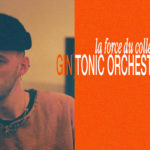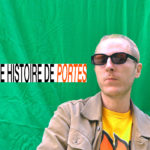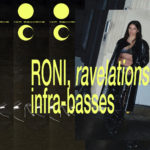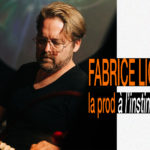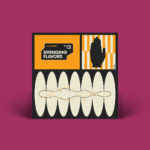Comme vous avez pu le constater, nous avons décidé pour 2013 d’adapter certains articles en anglais de façon à faire profiter à nos amis anglophones de nos découvertes. Aujourd’hui, nous vous proposons une interview de Traxx DJ & producteur américain hors du commun que nous avons eu l’honneur d’inviter à notre soirée d’anniversaire en octobre dernier! Pour garder l’essence de la conversation nous avons préféré la conserver en anglais. Bonne lecture !
If you are searching for an artist dedicated to his art, without any compromise of principle and with a special vision, Melvin aka Traxx is definitely someone who could seduce you. He belongs to the few ones from Chicago who came to play in Europe in the late 90’s and who has never fallen into the boring and mainstream part of music. Over the past few months, things have been changing and people have started considering his work but also his projects under the numerous musical aliases he endorses and on his label Nation which put forward a certain notion of music where commitment and avant-garde are always deeply present.
It’s obvious that Melvin is not a common artist in the so formatted world of electronic music, and this is probably why he starts to be successful only now. It’s hard to stay insensitive to a Traxx set, it’s more about distinct opinion, you hate it or you love it but you won’t hear so much hesitant reaction. Indeed this character is a risk taker avoiding obvious pattern and trying to move things forward. With dirty Criminals you could feel the signs of a certain wish to create Avant-Garde and offering something new, with Mutant Beat Dance we could see also this will to propose something else than platitude and consensus. That’s why we invited him to celebrate our third year with us, it was not only as a good dj, a symbol or as a simple a guest but because of whole which define what is an artists with convictions. We asked him few questions in order to enlighten who is Traxx. We joined his impressive set @ Batofar to this interview to give you an idea. Good reading!
– To the people who don’t know your work, how would you present yourself?
Hello, my name is Melvin, I call myself Traxx as a visonary/recording artist amongst other aliases, and as deck player. I run my own label Nation, hailing from Chicago, for six years now, and my peers and I pioneered the sound we like to call Jakbeat, which will be explained later.
– Could you tell us how did you get into music?
I was loving music from a very early age on. Sounds kind of cliché, but it’s the truth. My grandmother would play her gospel, Soul and Funk tunes while cleaning the house, and I would play her 45’s on my tippie-toes at her recordbox. From there it just progressed into liking all kinds of new music, Rap, Hip Hop, House, Disco… You all probably heard about WBMX and Hotmix5 radio-shows, so that was the stuff that turned me on.
– To you is it easy to digest a musical legacy and to be innovative in music?
In a way, yes and no. If you’re referring to the musical legacy of my hometown, Chicago, I would have to say it’s been a time that had a great impact on me. Going to the Musicbox to see Ron Hardy play was one of the most profound experiences of my life. All the music from that era, which is recently starting to be rediscovered, laid out the groundwork, or blueprint, of what Dance Music was, and was going to become. I was there when it happened first hand, and even today I am still amazed at the innovation in those years. So it is hard to keep up being innovative and fresh, since my label artists and myself are trying to capture the essence of that time, but transform it into a format that can live on into the future, taking influence from all chapters of Dance Music and beyond to create this own unique sound that is not necessarily tied to certain machines, synthesizers or sound aesthetics.
– How did you connect to Gigolo?
In 1996 I was invited over to Europe for the first time, by a lovely lady who became my first European agent: Katja Gowin. She managed to get me shows in Germany and also other countries, a few years later I played in Munich at the legendary Ultraschall. Hell came to see me play, and took me back to the International Deejay Gigolo‘s office, played me the version of his track “Passionate!“ that came out on Munich Machine. He asked me to remix it, but at that time I had not yet begun to dabble with recording or producing. It took almost a year for me to sit down and try this out… fueled by a breakup with my girlfriend at the time. I sat down with my partner Deecoy, bashed out my emotions and we did it !
– Why did you choose the alias Dirty Criminals what was the idea behind this collective?
The Dirty Criminals were James T. Cotton, Jamal Moss, Daryl Cura and myself. Chicago is famously known for one of the biggest criminal legends of history. You might have heard his name before: Al Capone. If you see the cover art for our first album we did on Gigolo, you can clearly see that we were trying to create a project in the aesthetics of Crime/Film Noir/Mafia-Cinema. And why Dirty? Well, listen to the music and you’ll know why.
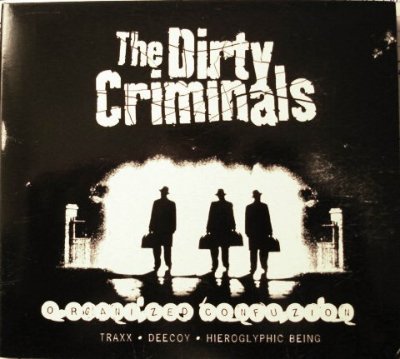
– You worked with Green Velvet, with hindsight what did you learn from this collaboration?
Curtis and me go way back. We are from the same city, so of course we knew of each other. But professionally our paths never really crossed other than playing parties together, until this one night… I played an unedited, unmastered version of X2s “Time Elevation Rhythm“. Tadd, Nick and I had just jammed and recorded the track, it was 24 minutes of crazyness. Curtis liked the track so much, after the party was over, he took me to his studio, forced me to edit the track right then and there, and begged me to put it out on his label Relief. When you look at the record, you can already see the Nation logo on there, as I was already imagining doing my own label, but it didn’t crystalize yet how I wanted to do it. To me, the Primitive Cypher EP was the first unofficial Nation’s record. And with this record, I think, the Jakbeat movement really started.
– What is Jakbeat?
Jakbeat is a term I coined in 2003, while I was in the studio with Tadd (JTC) and Nick (D’Marc Cantu). We just finished cutting some tracks that I felt were different from the other stuff we had previously done. It was in a way a tribute to what the music sounded like when we were growing up, but it was darker, grittier and heavier. Somehow I had the urge to give this a name, thus giving the feeling, the vibe and the attitude while we were recording an affiliation, meaning a term, or place, or thing that we could look to, in order to get ourselves back into that same feeling of emotional situation. I took out the C from “Jack“, since that term has been so washed out over the years, that I believe Jack is not alive anymore in the way he originally intended… it was more about the jaking feeling, when bodies are pumping on the dancefloor, dance pits form and people show their skills, this all happened back in the late 80s, early 90s. So “Jakbeat” is a mean to transport this excitement, this… lust… to dance into recorded machine sounds that will help you create that mind-state through musical stimulation. This is why Jakbeat is not tied to a certain genre, aesthetic, or sound. Jakbeat is a universal state of musical consciousness where rhythms and structures merge to create musical evidence of a higher bliss.
– How did you work with Gavin Russom?
I was playing with a friend of mine, Hugo Capablanca who runs Discos Capablanca, a label out of Berlin, in this place called Tausendbar. We had just finished the first Mutant Beat Dance project on his label, and he told me that Gavin Russom, who recorded with DFA Records was coming around to see us play. I was really happy to meet him, and his good-spirited nature, humour and musical knowledge resonated with me in a good way. We hit it off instantly, and we are very good friends till this day. When LCD Soundsystem ended, and Gavin started his newest project The Crystal Ark, he asked me to remix one of his earlier productions. I am always reluctant when it comes to remixes, since it’s something i don’t really like to do. But the material sounded great, and Beau and I got together and completely wrote a new track called the “Mutant Beat Dance Adjustment”.
– What do you think of the current definition of musical genre and the way it segments the underground music industry today?
I don’t like genres, to be honest. They are just a way to lay out of the countless ways to interpret music. If you give something a specific name, you also give it a content. And if you try branching out of those given, or expected parameters, everyone feels the need to give that a name, instead of just taking it at face value and experience the music for what it is supposed to be. When i use terms like Jakbeat, Cosmic, Balearic, Techno or Wave I am rather talking about the way this particular musical piece makes me FEEL, instead of what it would be categorized as. Which brings me to the next point of how segmented the industry is. In my opinion the industry is not really segmented from the outside, it segmented itself from the inside. After electronic music became as popular as it is today, some things just “sold“ better… they worked, they created financial stability and therefore savy businessmen knew how to incorporate this movement, and made it a commodity. But in the last couple of years i see that people are opening up more to new sounds , which is also benefiting artists like myself, and so many others that put their hearts and visions on the line. And this let’s me have hope for the future…
– Is that easy to be a Dj when you come from Chicago? How is the weight of the musical legacy? Is that really digested?
Well, Chicago is known for having great “Diskjock-talent”, but it is also a very competitive town. You have a guy on every city block that wants to make it with his skills, just as much as you do, so when diskjocks get down in Chicago the stakes are high, and you have to be victorious at the end of the night. Lucky for me i don’t like to put myself in situations where i have to play the field of what it is that people in Chicago still remember. The musical legacy in my hometown reflects such great significance, that a lot of people still can’t let go of it. Every weekend there is a party going on somewhere, with nothing but old-school records being played. Which makes me think … What about the new stuff? What about going a different route? I voice my opinion about that very openly and publicly, maybe that’s why Chicago itself hasn’t got so much love for me… but I love my city, and my friends and family who live there, and we keep fighting the fight as long as we can.
– What is the the link between music and religion to you?
My Grandmother always took me to church when I was younger, and I was amazed by the power of the music there. I am baptized, and I am of Christian faith. This is how my spirituality and my music are connected. I called my first album Faith because it was very important to me to not only show my religious faith, but also the musical faith i have, in believing that what I do musically is righteous and honest.
– Do you think that music has something prophetic?
It can have that for a few people, yes. But I see it as music being able for people to overcome certain states in their life’s, and to find peace, or freedom with themselves. So this “can“be very prophetic, but not in the religious sense maybe. Not my music at least. Gospel music has been around for decades, and is still going strong, and in that instance music can be something very prophetic in spreading the good word.
– Why do you think there was these delay between the work you’ve done and the recognition of it in the industry?
Sometimes it takes a while for people to wrap their minds around new concepts. I started my label near the end of the Minimal craze, and I thought people would embrace something fresh and exciting. But it took a while, and I have my European agent to thank for a lot of this recognition i am getting these days. He really believed in me, and constantly convinced people to give this Jakbeat-thing I came up with a chance. So when he sent me into battle, I did my best on the decks, and did everything I could to play the music I want it to be presented, and slowly, but surely people are catching on to what i do, or did all these years.
– Could present us Mutant Beat Dance?
Mutant Beat Dance is Beau Wanzer and myself. We started recording tracks together in 2006, and have since released 5 12“ and recorded a remix for Gavin Russom, with new material being released soon.
– Why have waited for 12 years before releasing Charles Manier’s work?
Because Manier was so ahead of his time and he still is. I just felt that now is the right time, after several other labels, big labels turned him down. But after the reissues from labels like Minimal Wave, Dark Entries, Mannequin and several other compilations that came out, the rise in interest for hardware-based minimalistic wave and early protoelectronics made it interesting for me to release this project now. I am a huge fan of everything Liaisons Dangereuses, CHBB, Das Ding and Charles Manier transported this feeling so impeccably on this album, that I am left for words. I played the material throughout the years to test it on people, and now in 2013 i took the step. And I have not regreted it.
– You’re promoting an analog way to produce music and to play it. Do you think it’s good to have limits in music?
My point is this: If you haven’t learned the basics first, how can you be good at the next level? I don’t see why hardware should limit my possibilities… instead it gives me a more natural feel to deliver a certain mood, a moment, a spur of imagination i have and to bring it to life with the help of machines. I just try to capture emotions and freeze frame them in time for eternity.
– Is the message to deliver with the music more important than the way it’s delivered?
Yes, definitely. When it comes to playing wax, I don’t like people to use a computer. I can understand it, but I will always give you a hard time about it. Haha. But in the end it’s about the way artists transport their feelings to the other persons in the room, the dancers.
– In your opinion, is there a cathartic aspect in your relationship to music?
Cathartic in a sense where I want people to let go of their everyday problems and anxieties, definitely yes. Cathartic in a metabolic sense, probably not. I sweat a lot when I play, so maybe this is cleansing for me, because I give 110% of what i am able to give. Sometimes i am so worn out after a long session, I immediately fall into bed and sleep… other times I am so full of energy BECAUSE of the session, that i can’t sleep for god knows how many hours. It’s all depending on the vibe and if it resonates with me. And my emotional state is very important, because when I play i let all my feelings out… anger, hate… but also love, and happiness… when i am done playing i went through all emotional states i could get myself into in that particular moment, so yes, there is definitely a cleansing aspect to it, because it also helps me to deal with my hectic schedule. Now, if we are talking about the people on the dancefloor? Well, they do sweat also, but while I am in the booth drinking water, going through my phases in my own world, people tend to drink alcohol, smoke cigarettes, do drugs… this is something i don’t do. I’ve never taken hard drugs in my life, and i don’t intend to. All i do is smoke weed, and I’m not ashamed to say it. Also I enjoy my glass of wine here and there, and a beer every now and then when I’m hanging out with my buddys, but i am a light drinker. Alcohol really gets to me.
– Could you define the Kode?
The Kode is a creed i live by. It’s somewhat the result of a self-observation I did with myself. It’s about the way I talk, the way I express myself when I am around other people. Everyone I know and like, I give a nickname, that only I call this person by. It sifts through to other people as well, but that’s okay, as long as it stays in the family. It’s never meant in a bad way, I just like to branch out of the everyday rituals and mannerisms. The Kode is the message I try to convey and receive while I am playing records, or while I am producing… It has a lot to do with the vocals, a line of the lyrics, the feeling of a certain song that has a meaning for me and somehow I try to voice my opinion or emotion by using these techniques through the music. Kode is also a production company I started with my good friend Andrew. He records as Naughty Wood, and has contributed vocals to quite a few songs from in and around the Nation family. We hosted a few events under the Kode name, until I decided this year to name the first sublabel of Nation by this name: Kode. It’s a special sublabel that will only see few releases, and is always special projects with very limited quantities, and of course, no repress again.
– Why did you choose Nation as label name?
“Nation” came to me, when I thought about the ramification of my starting my own label. I already knew that JTC and D’Marc Cantu were going to be released a lot, with various aliases and projects. We formed this bond, through the music, and the shared experience of being in the studio together… and I said to myself: We are kind of like our own little family. But I couldn’t name the label “Family”, since that is a very strict concept of people living together. Whereas a “Nation” can have people moving in and out from it, a Nation can grow and create more inhabitants. This is what I am trying to do with my label. I am always searching for new members to add, as long as they come with some sick music. And a Nation can never shut itself out to the people out there. By buying my music, and supporting the label, they become part of the Nation too. Once again: Universality…
– What do you think about rules?
I follow my own rules. Because I just can’t wrap my head around the idea, that some time in the past somebody said: this is the way it has to go. And that’s that! I decide for myself the way it has to go. Some people tend to have a problem with that, and let me tell you. I am not here to kiss anyones ass, but I don’t want anyone to kiss my ass either. We are all in this together, and if we meet with mutual respect there won’t be any problems.
– What do you think about nostalgic people and the “It was better before”?
It’s kind of a double-edged sword, really. I drain my energy from those times as well, and like I explained above it is of great significance to me, but I don’t well in the past. I think these people need to grow up. I get asked all the time: “Why don’t you play like you played in the 90s?” Well, because that was then! What about the present, what about the future? I believe there is more merit in trying to create something new out of the influences from the past, than to keep reitterating the same formulas. Maybe the nostalgic people are bitter, because they haven’t realized yet that doing something about preserving the past in a more futuristic format is a much better way to also preserve and honor it, instead of not doing anything about it, and keep reliving and rehearing the same stuff over and over again.
– In an interview with RA you told “I am not like anyone on the face of this planet. I am in my own world.” You seem to have a very particular dialectic with yourself, and what you want to exteriorize”. Sometimes, does it make it difficult to communicate with other people?
That might be true. Communication nowadays is very difficult, since it’s all about emails, and Facebook, and all that social media. I am a very impulsive person, and sometimes with these digital mediums things get lost in translation. Mix that with language barriers of foreign people for example, and if you don’t pay attention you can find yourself in the most hairy kind of situations. Usually when this happens a phone call will take care of even the most riddled situations, since I deal better with this kind of communication. Also meeting me in person, getting to know me a bit better or hanging out with me is a much better way to, experience, or understand my world. But it’s also a two-way street. I met so many great people along the many years I am playing and writing music, and they always have my back, and I will always have theirs. Once the ice is broken, it rarely freezes again.
– Do you pay attention from where you come and where you go?
Of course I do. Life is a learning experience, and I am always mindful of where I come from, and I try to learn, so I can be better in the future, where I am going.
– What is the future for Traxx in the next months?
Well, I am going back to Chicago to work on music, got a couple of projects and releases coming on the label. Playing a bunch of shows in the States is also on the agenda. I will most likely return to Europe in april next year to stay again for a couple of months, and hopefully return to Paris again in that time. If you want to keep tabs on what I am up to, you can do so at various outlets. We have a Nation fanpage on Facebook, we have a Soundcloud account you can follow, where we post music, sessions and snippets of upcoming releases.
Nation on Facebook, on Internet, on Soundcloud


